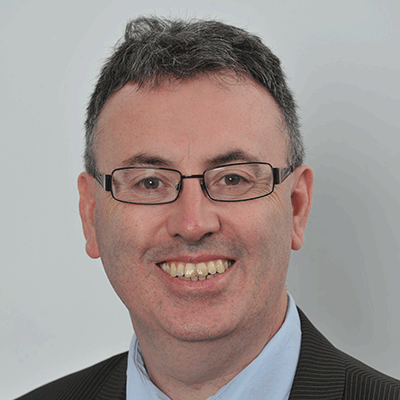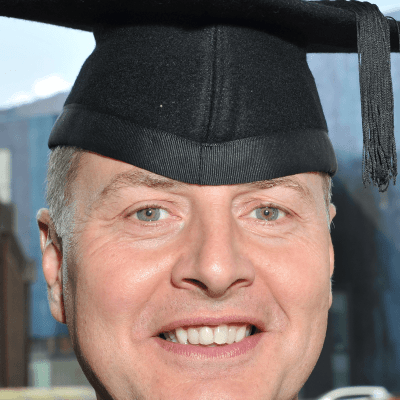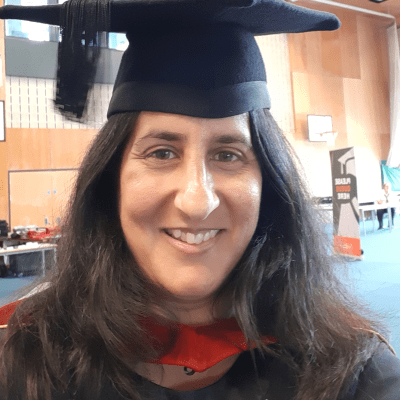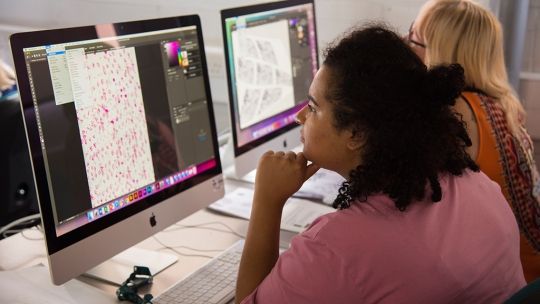BSc (Hons) Computing with Web Development
- Study Mode: Full Time
- Location: High Wycombe
- Duration: Three or Four Years
- Start Date: September 2024
Sharpen your skills and prepare yourself for the workplace by studying our BSc (Hons) in Computing and Web Development. From the latest developments in industry to cutting-edge applications you will be able to learn how computer theory and web development can work hand-in-hand to provide an exciting and fast paced career.
You will have access to fully equipped computing facilities and be taught by expert lecturers providing high quality teaching and support in a friendly, motivated learning environment . You’ll also benefit from our partnership with Amazon where we run its AWS Academy, allowing you to gain industry standard knowledge and skills and further enhance your career prospects.
Why study this subject?
Now is an exciting time to study a computing-related degree, as we are seeing technology opening up and evolving the way in which we communicate, work and socialise. A degree in Computing and Web Development could lead to start a fast-paced and fulfilling career in a wide variety of sectors, including business, health care, hospitality, sport, aviation, travel, education and finance, to name just a few!
There has been an increase in demand from companies looking for employees with strong digital skills and knowledge and a Computing and Web Development degree is the perfect way to gain a detailed understanding of the computing theory and programming concepts needed to make your mark in the technology sector.
The teaching staff have gone above and beyond to make sure we are confident and equipped when entering the industry. This has been achieved by providing us with excellent real-world scenarios that prepare us for any future endeavours within the computing world.Anum Hanif

Why study at Buckinghamshire New University?
Give yourself an edge in the graduate market by studying a hands-on degree. You’ll have the opportunity to learn the latest industry knowledge alongside working with industry professionals to gain invaluable practical experience whilst building your network base. Studying our programme allows you to learn fundamental vocational skills such as analysis and design, programming and testing, networking and security, software engineering and databases.
We are a student focused and employer-led university which means that you are at the forefront of all that we do. We provide you with a thorough understanding in computing and systems, web development and programming and our modules are designed to reflect the latest issues in the constantly changing area of computing to ensure you graduate ready for employment or further postgraduate study.
Not only will you be learning vital information, you will be learning from innovative, forward-thinking and highly motivated expert lecturers. Our lecturers have close industrial links and all work together to ensure that you have the best possible enriched and stimulating learning environment.
To further enhance your education, we invite in guest lectures to share their experience and expertise and host day-long interactive events run by leaders in their field giving you the chance to put your knowledge into action.
Opportunity modules are a key part of the BNU curriculum. You’ll choose modules in both your first and second year from a broad selection in areas such as sustainability, entrepreneurship, creativity, digital skills, personal growth, civic engagement, health & wellbeing and employment. Opportunity modules are designed to enable you to develop outside the traditional boundaries of your discipline and help you to further stand out from the crowd to future employers.
Our specialisms
Buckinghamshire New University gives you the opportunity to choose your specialism for your future career after your experience of the core curriculum in year one. Rather than having to make your big decision before you join us, we introduce you to various specialisms and offer you the flexibility to choose the specialism which leads to your chosen speciality. You can choose between BSc (Hons) Computing with Web Development or BSc (Hons) Computing.
These specialisms are also offered as four-year programmes, including an initial Foundation Year. The Foundation Year will allow you to develop your academic study skills and build confidence in your abilities, identifying your own strengths and development needs for progression onto an undergraduate programme.
I was very well prepared for work as we had studied a work-based project in the second year which gave me valuable experience and I was also helped with CV writing which helped tremendously when applying for work.Nigel Allen IT & Cloud Services Manager, ATE Enterprises

What facilities can I use?
We’ve invested in a range of state-of-the-art facilities across our campuses to support your learning. Our computing facilities are packed with the latest industry-standard equipment and software, meaning you can make an easy transition from education into employment. Most of our large computing labs have dual-screen, dual boot (Windows and Linux) systems.
Hands-on experience is what we are all about. We have numerous devices that will provide the basis for various supervised projects you will carry out across the programme. These include but are not limited to Virtual Reality headsets, 3D printers, Raspberry Pi microcomputers, EEG headsets.
Our library is the perfect place to find the resources you need and a quiet place to study, filled with four floors of books, journals, computer suites and study rooms. Or, if you’d rather work off campus, e-Journals and resources are only a few clicks away using our Virtual Learning Environment.
What will I study?
This programme is founded in software and web technologies with a focus on the technical side of web-based applications and services for working in industries that require expertise in web focused sectors of computing. You will gain an appreciation of the role that web-based computing can have in a range of business and industry contexts. The course provides a balance of theory and practice, providing opportunities to apply knowledge into real projects where possible. You will acquire a wide range of skills and competences such as the ability to think critically about real-world problems. You will be exposed to a variety of computing discipline areas, so that you will then be able to select and apply appropriate principles, theories, best practices and appropriate technologies to address the needs of different business contexts, users, customers and stakeholders.
You will also get opportunities to expand your knowledge both inside and outside of the lecture theatre. Students have previously attended Amazon AWS Forums and visited sites of historical importance, including Bletchley Park, to learn more about the history of computing and how it impacted the world.
You’ll work on developing a range of knowledge and skills to provide you with a solid foundation of the fundamentals of computing, looking at a range of topics from computer architectures to networking (Cisco), application programming to web development, and user experience to digital technologies.
Evolving the abilities you started building in your first year you’ll start applying your critical thinking and research skills to your learning. You will focus on subjects including network systems (Cisco), database design, web applications, open source systems, mobile systems and software engineering.
By the end of your time with us you’ll be putting all you have learnt into action with more independent based learning and research projects. You will study areas such as cloud computing, enterprise systems development, artificial intelligence, network security, advanced mobile systems, and advanced programming.
How will I be taught and assessed?
At Buckinghamshire New University we like to foster an interactive and student-focused teaching style where we have a combination of formal lectures, tutorials, practical lab sessions, seminars and guest speakers to enhance the learning experience.
Our lecturers work closely with industry through partnerships or by helping web development and related industries with research, consultancy, technical and managerial inputs. These relationships provide a professional edge to our teaching. They are also a useful source of internship and industry-brief opportunities for our students.
You are more than a number at BNU, and we are here to support you through your education journey. We have in place regular contact hours with our tutors and provide you with informal feedback throughout the programme of study.
The wider Computing Department and our Careers service also offer development opportunities that may involve placements, internships or employment in local companies. Many students benefit from industry placement opportunities in their final year.
Over the years of your course you will be assessed and graded in a multitude of ways to allow you to develop and expand on your abilities and skills. Assessments for the various modules will mostly take the form of practical coursework, lab test and written exams. However, the main focus will be on testing the practical application of the various concepts and techniques being conveyed.
The range of traditional modules and modern computing topic modules on offer at BNU helped me stand out from the crowd when looking for a role after graduating.Robert Collcott 1st Line Engineer and IT Technician, Focus Networks Ltd

What are the course entry requirements?
A typical offer will require a UCAS tariff score of: 88 - 112 (Full-time) or 32 - 56 (Foundation Year)
UCAS points can be obtained through qualifications such as A levels, T levels, BTEC or an Access to Higher Education course in a relevant subject. Please list all your qualifications on the application form as you will be asked to provide copies when we receive your application.
A minimum of two full A-levels (or equivalent) is required as well as GCSE Maths and English at grade C/4. Every application is considered on an individual basis.
For further details of our international English entry requirements, please visit our international pages.
Applicants who do not meet the minimum requirements for the three-year undergraduate programme, or those who do not feel fully prepared for a degree course, can apply for a four-year programme including a Foundation Year; find out more.
Modules
This provides a guide of the modules that make up your course. You can find more information about how your course is structured on our Academic Advice section.
This course has Opportunity modules.
Opportunity modules are a key part of the BNU curriculum. You’ll choose modules in both your first and second year from a broad selection in areas such as sustainability, entrepreneurship, creativity, digital skills, personal growth, civic engagement, health & wellbeing and employment. Opportunity modules are designed to enable you to develop outside the traditional boundaries of your discipline and help you to further stand out from the crowd to future employers. Find out more.
You must choose 2 x 10 credit Level 4 Opportunity modules from the Opportunity module catalogue.
In addition, you must choose 2 x 10 credit Level 5 Opportunity modules from the Opportunity module catalogue.
What are the tuition fees
Home
-
Home, Academic Year 2024 - 2025: £9,250 per year
International
-
Overseas/International, Academic Year 2024 - 2025: £15,150 per year
What are my career prospects?
Throughout your time with us we’ll support you on the route to your chosen career. We’ll help you to develop crucial skills, encouraging you to become enterprising, employable and good leaders. We also help you find employment after graduation. Have a look at our Careers and Employability pages to find out more.
We are very proud of our reputation for delivering industry standard courses and the success our graduates achieve after leaving the University. Our BSc (Hons) Computing and Web Development degree is perfect for gaining a vocational approach to the modern computing industry, the skills and abilities that are garnered across the duration of the course are very versatile and we have seen graduates from the course go on to study with international companies, including:
- Amazon AWS
- IBM
- SAP
- HS2
- Honda
- BT
- Capita
You may also choose to continue your studies, and work towards a postgraduate degree or professional certification, or to specialise in the emerging challenges of cyber security and big data analytics.
At Buckinghamshire New University, we offer a wide range of postgraduate programmes to choose from, including our MSc in Cyber Security.
Make the most of advice from lecturers, especially in planning assignments. Use the services available, including the Careers and Employability team; they are really helpful especially on input, advice and preparing your CV for employment.Robert Collcott 1st Line Engineer and IT Technician, Focus Networks Ltd

Course leader



- Deputy Head of School (Creative and Digital Industries)
- Associate Professor














